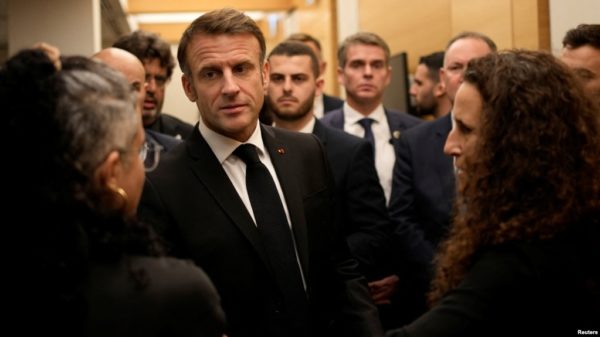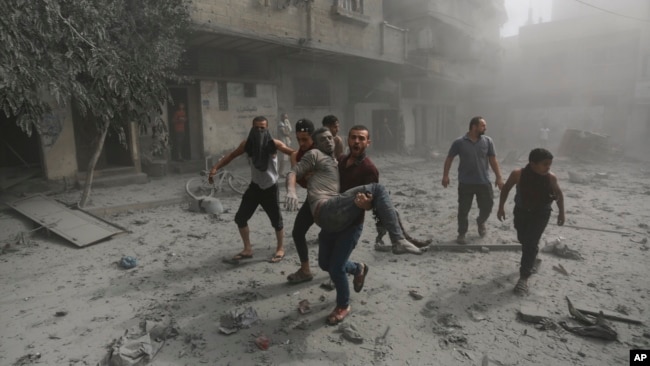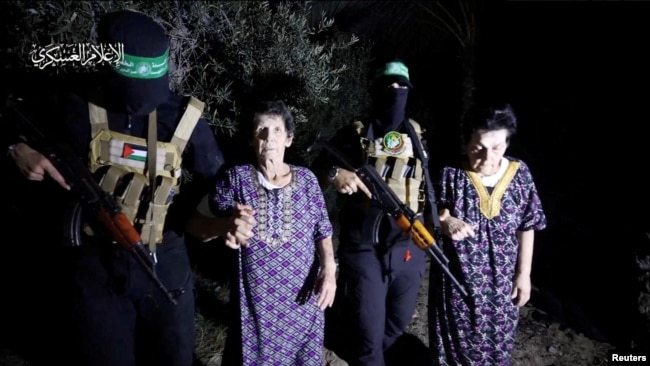 French President Emmanuel Macron visited Israel Tuesday, becoming the latest world leader to bring both a message of solidarity with Israel following a deadly Hamas attack and a push for protecting civilians in the Gaza Strip.
French President Emmanuel Macron visited Israel Tuesday, becoming the latest world leader to bring both a message of solidarity with Israel following a deadly Hamas attack and a push for protecting civilians in the Gaza Strip.
Macron told Israeli President Isaac Herzog that what happened will “never be forgotten” and that a top priority should be the release of all hostages held by Hamas.
“I want you to be sure that you are not left alone in this war against terrorism,” Macron said.
The Israeli military said Tuesday it carried out continued airstrikes in Gaza, including targeting Hamas operational headquarters and killing several Hamas deputy commanders.
Israeli strikes this week have also hit the Lebanon-based militant group Hezbollah, and Herzog warned Tuesday that if Hezbollah expands the conflict, then “Lebanon will pay the price.”
“I want to make clear: we are not looking for a confrontation on our northern border or with anyone else,” Herzog said. “We are focused on destroying Hamas infrastructure and bringing our citizens back home.”
The White House said U.S. President Joe Biden and Israeli Prime Minister Benjamin Netanyahu discussed “ongoing efforts at regional deterrence, to including new U.S. military deployments” in a phone call Monday.
U.S. officials in recent days have expressed concerns that the Israel-Hamas war could spark a wider conflict in the Middle East.
National Security Council spokesperson John Kirby told reporters Monday there had been an increase in rocket and drone attacks by Iranian-backed militias on U.S. troops in Iraq and Syria. He said the United States was “deeply concerned about the possibility for any significant escalation” in attacks in the coming days.
The White House said Biden in his call with Netanyahu welcomed the Hamas release of two more hostages, “and reaffirmed his commitment to ongoing efforts to secure the release of all the remaining hostages taken by Hamas – including Americans – and to provide for safe passage for U.S. citizens and other civilians in Gaza.”
Hamas said in a statement that it released the hostages – two elderly Israel women – for humanitarian reasons. The International Committee of the Red Cross said it transported the Israeli women, an 85-year-old and a 79-year-old, out of Gaza Monday evening.
The militant group released its first two hostages — an American mother and daughter — Friday, nearly two weeks after it carried out its surprise assault on Israel, killing more than 1,400 people, mostly civilians, and capturing more than 200 others.
U.S. officials say Washington is advising Israel to delay its planned ground invasion of the Gaza Strip to allow more time to negotiate the release of the hostages being held by Hamas.
A ground invasion would likely further complicate any negotiations over hostages, with at least some of them believed to be held in an elaborate web of tunnels that militants have built in Gaza over the years even as Israel has blockaded the territory along the Mediterranean Sea.
Israeli has positioned 300,000 troops along the Gaza border ahead of a potential operation inside Gaza.
The Palestinian Health Ministry said Monday that the total death toll in Gaza from more than two weeks of conflict had reached at least 5,087 people, with another 15,273 people injured.
The Israeli strikes have destroyed thousands of buildings in Gaza, and the U.N. humanitarian agency says 1.4 million people have been displaced.
In its latest report, the U.N. Office for the Coordination of Humanitarian Affairs said late Monday that at least 16 health workers had been killed while on duty in Gaza. It also said 35 staff members from the U.N.’s Palestinian refugee relief agency have been killed, including six during the past day.
In New York, the U.N. Security Council is set to hold a meeting Tuesday to discuss the situation in the Middle East.
U.N. Secretary-General Antonio Guterres and U.N. aid chief Martin Griffiths are expected to address the meeting. U.S. Secretary of State Antony Blinken and the Israeli and Palestinian foreign ministers are expected to attend, along with their counterparts from Brazil, France, Jordan, Egypt, Saudi Arabia and other countries.
United Nations correspondent Margaret Besheer contributed to this article. Some information for this report came from The Associated Press, Agence France-Presse and Reuters.

